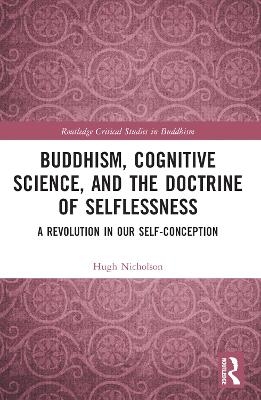
Buddhism, Cognitive Science, and the Doctrine of Selflessness
A Revolution in Our Self-Conception
Seiten
2024
Routledge (Verlag)
978-1-032-30205-8 (ISBN)
Routledge (Verlag)
978-1-032-30205-8 (ISBN)
This book examines the relationship between Buddhist philosophy and scientific psychology by focusing on the doctrine of No-self. A novel contribution to the study of Buddhist Philosophy, the book will also be of interest to scholars of Buddhist Studies and Asian Religions.
This book examines the relationship between Buddhist philosophy and scientific psychology by focusing on the doctrine of No-self.
The hypothesis is that No-self can function as an instrument of counter-induction, that is, an alternative conceptual scheme that exposes by contrast the intuitive or "folk" theoretical presuppositions sedimented in our perception of ourselves and others. When incorporated into regimens of meditative and ritual practice, the No-self doctrine works to challenge and disrupt our naïve folk psychology. The author argues that there is a fruitful parallel between the No-self doctrine and anti-Cartesian trends in the cognitive sciences. The No-self doctrine was the product of philosophical speculation undertaken in the context of hegemonic struggles with both Buddhist and non-Buddhist rivals, and the classic No-self doctrine, accordingly, is a somewhat schematic and largely accidental anticipation of the current scientific understanding of the mind and consciousness. Nevertheless, inasmuch as it challenges and unsettles the seemingly self-evident certitudes of folk psychology, it prepares the ground for the revolution in our self-conception promised by the emerging cognitive scientific concept of mind.
A novel contribution to the study of Buddhist Philosophy, the book will also be of interest to scholars of Buddhist Studies and Asian Religions.
This book examines the relationship between Buddhist philosophy and scientific psychology by focusing on the doctrine of No-self.
The hypothesis is that No-self can function as an instrument of counter-induction, that is, an alternative conceptual scheme that exposes by contrast the intuitive or "folk" theoretical presuppositions sedimented in our perception of ourselves and others. When incorporated into regimens of meditative and ritual practice, the No-self doctrine works to challenge and disrupt our naïve folk psychology. The author argues that there is a fruitful parallel between the No-self doctrine and anti-Cartesian trends in the cognitive sciences. The No-self doctrine was the product of philosophical speculation undertaken in the context of hegemonic struggles with both Buddhist and non-Buddhist rivals, and the classic No-self doctrine, accordingly, is a somewhat schematic and largely accidental anticipation of the current scientific understanding of the mind and consciousness. Nevertheless, inasmuch as it challenges and unsettles the seemingly self-evident certitudes of folk psychology, it prepares the ground for the revolution in our self-conception promised by the emerging cognitive scientific concept of mind.
A novel contribution to the study of Buddhist Philosophy, the book will also be of interest to scholars of Buddhist Studies and Asian Religions.
Hugh Nicholson is Professor of Religious Studies at Loyola University Chicago, USA. He is a scholar of comparative religion with a specialization in South Asian religions.
Preface; Abbreviations; Introduction: Against the Current; Chapter 1: Everyday Mindreading; Chapter 2: Buddhist Selflessness; Chapter 3: Anti-Cartesian Meditations; Chapter 4: No-self and the Demythologization of Buddhism; Chapter 5: Buddhist No-self as Proto-Idea; Chapter 6: Mahāyāna Perspectives on Selflessness: Emptiness and Representation Only; Chapter 7: Agentless Action in Zen
| Erscheinungsdatum | 05.09.2022 |
|---|---|
| Reihe/Serie | Routledge Critical Studies in Buddhism |
| Zusatzinfo | 6 Halftones, black and white; 6 Illustrations, black and white |
| Verlagsort | London |
| Sprache | englisch |
| Maße | 156 x 234 mm |
| Gewicht | 435 g |
| Themenwelt | Geisteswissenschaften ► Religion / Theologie ► Buddhismus |
| Sozialwissenschaften ► Ethnologie | |
| Sozialwissenschaften ► Soziologie ► Spezielle Soziologien | |
| ISBN-10 | 1-032-30205-4 / 1032302054 |
| ISBN-13 | 978-1-032-30205-8 / 9781032302058 |
| Zustand | Neuware |
| Informationen gemäß Produktsicherheitsverordnung (GPSR) | |
| Haben Sie eine Frage zum Produkt? |
Mehr entdecken
aus dem Bereich
aus dem Bereich
Unterweisungen in Zen-Meditation
Buch | Hardcover (2024)
Arkana (Verlag)
20,00 €


